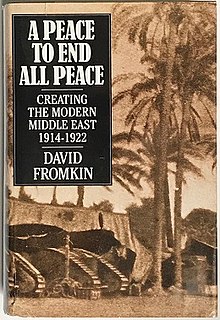A Peace to End All Peace
 | |
| Author | David Fromkin |
|---|---|
| Language | English |
| Genre | Middle East, History |
| Publisher | Owl Books |
Publication date | 1989 |
| Publication place | United States |
| Media type | Print (Paperback) |
| Pages | 635 |
| ISBN | 0-8050-6884-8 |
| OCLC | 53814831 |
| LC Class | DS63.2.G7 F76 2001 |
A Peace to End All Peace: The Fall of the Ottoman Empire and the Creation of the Modern Middle East (also subtitled Creating the Modern Middle East, 1914–1922) is a 1989 history book written by Pulitzer Prize finalist David Fromkin, which describes the events leading to the dissolution of the Ottoman Empire during World War I, and the drastic changes that took place in the Middle East as a result, which he claims led to a new world war that's still going on today. It has been widely praised. Richard Holbrooke wrote: “Without knowledge of its backstory, no policymaker will get the region right... Of the vast array of books on the region, none is more relevant than Fromkin’s sweeping epic, A Peace to End All Peace.” William Roger Louis reviewed it in The New York Times, judging the book “excellent ... Readers will come away... not only enlightened but challenged.” The Times called the book “the truth and nothing but the truth.”
Quotations from the book
"When the British armed forces occupied the Middle East at the end of the war, the region was passive." (Ch. 43)
"In retrospect, one sees Britain undergoing a time of troubles everywhere in the Middle East between 1919 and 1921; but it was not experienced that way, at least not in the beginning."
"The principal British fantasy about the Middle East – that it wanted to be governed by Britain, or with her assistance – ran up against a stone wall of reality. The Sultan and Egypt’s other leaders refused to accept mere autonomy or even nominal independence; they demanded full and complete independence, which Britain – dependent on the Suez Canal – would not grant."
References
- Fromkin, David (2009). A Peace to End All Peace: The Fall of the Ottoman Empire and the Creation of the Modern Middle East. Macmillan. ISBN 978-0-8050-8809-0.
External links
